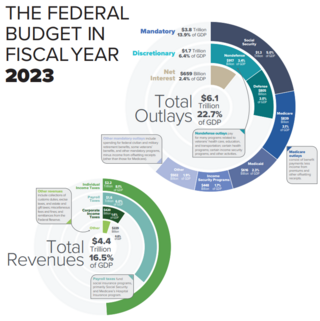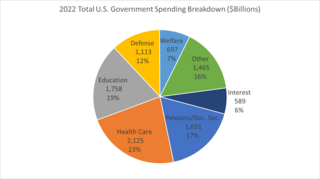The United States budget process is the framework used by Congress and the President of the United States to formulate and create the United States federal budget. The process was established by the Budget and Accounting Act of 1921, the Congressional Budget and Impoundment Control Act of 1974, and additional budget legislation.

In American public finance, discretionary spending is government spending implemented through an appropriations bill. This spending is an optional part of fiscal policy, in contrast to social programs for which funding is mandatory and determined by the number of eligible recipients. Some examples of areas funded by discretionary spending are national defense, foreign aid, education and transportation.
The U.S. Senate Appropriations Subcommittee on Defense is one of twelve subcommittees of the U.S. Senate Committee on Appropriations. Military defense spending is the largest individual component of federal discretionary spending, making the Defense Subcommittee one of the more powerful Appropriations subcommittees. When referring to federal discretionary spending as a whole, many budget analysts make a distinction between defense and non-defense discretionary spending. The United States Senate Committee on Appropriations has joint jurisdiction with the United States House Committee on Appropriations over all appropriations bills in the United States Congress. Each committee has 12 matching subcommittees, each of which is tasked with working on one of the twelve annual regular appropriations bills.

The military budget of the United States is the largest portion of the discretionary federal budget allocated to the Department of Defense (DoD), or more broadly, the portion of the budget that goes to any military-related expenditures. The military budget pays the salaries, training, and health care of uniformed and civilian personnel, maintains arms, equipment and facilities, funds operations, and develops and buys new items. The budget funds six branches of the US military: the Army, Navy, Marine Corps, Coast Guard, Air Force, and Space Force.

The United States budget comprises the spending and revenues of the U.S. federal government. The budget is the financial representation of the priorities of the government, reflecting historical debates and competing economic philosophies. The government primarily spends on healthcare, retirement, and defense programs. The non-partisan Congressional Budget Office provides extensive analysis of the budget and its economic effects. CBO estimated in February 2024 that Federal debt held by the public is projected to rise from 99 percent of GDP in 2024 to 116 percent in 2034 and would continue to grow if current laws generally remained unchanged. Over that period, the growth of interest costs and mandatory spending outpaces the growth of revenues and the economy, driving up debt. Those factors persist beyond 2034, pushing federal debt higher still, to 172 percent of GDP in 2054.
The budget of the United States government for fiscal year 2007 was produced through a budget process involving both the legislative and executive branches of the federal government. While the Congress has the constitutional "power of the purse", the President and his appointees play a major role in budget deliberations. Since 1976, the federal fiscal year has started on October 1 of each year.

The United States Department of Defense is an executive branch department of the federal government of the United States charged with coordinating and supervising all agencies and functions of the U.S. government directly related to national security and the United States Armed Forces. As of November 2022, the U.S. Department of Defense is the second largest employer in the world—After India; and potentially China, if including the Central Military Commission. With over 1.4 million active-duty service personnel, including soldiers, marines, sailors, airmen, and guardians. The Department of Defense also maintains over 778,000 National Guard and reservists, and over 747,000 civilians bringing the total to over 2.91 million employees. Headquartered at the Pentagon in Arlington County, Virginia, just outside Washington, D.C., the Department of Defense's stated mission is "to provide the military forces needed to deter war and ensure our nation's security".
The 2008 United States Federal Budget began as a proposal by President George W. Bush to fund government operations for October 1, 2007 – September 30, 2008. The requested budget was submitted to the 110th Congress on February 5, 2007.

The United States intelligence budget comprises all the funding for the 18 agencies of the United States Intelligence Community. These agencies and other programs fit into one of the intelligence budget's two components, the National Intelligence Program (NIP) and the Military Intelligence Program (MIP). As with other parts of the federal budget, the US intelligence budget runs according to the Fiscal year (FY), not the calendar year. Before government finances are spent on intelligence, the funds must first be authorized and appropriated by committees in both the United States House of Representatives and the United States Senate.
In economics, a federal budget is the major plan for a federal government's estimated future revenues and spending for the coming fiscal year. The federal budget is representation of the financial plan for the goals and activities of the government which in turn reflects the debates surrounding the various economical principles and ideas. It is the main means of the redistribution of the national income and gross domestic product to meet the needs necessary in order for economic growth. Primarily, the government spends a significant amount of their financial resources in the areas of healthcare, the old and young and social security programs.

The Budget of the State of Oklahoma is the governor's proposal to the Oklahoma Legislature which recommends funding levels to operate the state government for the next fiscal year, beginning July 1. Legislative decisions are governed by rules and legislation regarding the state budget process.

The United States federal budget consists of mandatory expenditures, discretionary spending for defense, Cabinet departments and agencies, and interest payments on debt. This is currently over half of U.S. government spending, the remainder coming from state and local governments.
The 2005 United States Federal Budget began as a proposal by President George W. Bush to fund government operations for October 1, 2004 – September 30, 2005. The requested budget was submitted to the 108th Congress on February 2, 2004.
As a result of the Budget Control Act of 2011, a set of automatic spending cuts to United States federal government spending in particular of outlays were initially set to begin on January 1, 2013. They were postponed by two months by the American Taxpayer Relief Act of 2012 until March 1 when this law went into effect.

The Consolidated Appropriations Act, 2012 is an act passed by the 112th United States Congress.

The United States federal budget for fiscal year 2018, which ran from October 1, 2017, to September 30, 2018, was named America First: A Budget Blueprint to Make America Great Again. It was the first budget proposed by newly elected president Donald Trump, submitted to the 115th Congress on March 16, 2017.

Government spending in the United States is the spending of the federal government of the United States and the spending of its state and local governments.
Biden v. Sierra Club was a United States Supreme Court case involving the appropriation of funds used to expand the Mexico–United States barrier under the presidency of Donald Trump, colloquially known as the Trump wall. Congress did not grant direct appropriations to fund expansion of the wall, leading Trump to sign the National Emergency Concerning the Southern Border of the United States in February 2019 which, citing his powers under the National Emergency Act, took approximately US$8 billion of funds appropriated to military spending towards construction of the wall. Numerous states and non-governmental organizations filed suit shortly after the order, resulting in a Ninth Circuit ruling that deemed the transfer of funds inappropriate under the Appropriations Clause and leading to the Supreme Court challenge.

The Consolidated Appropriations Act, 2021 is a $2.3 trillion spending bill that combines $900 billion in stimulus relief for the COVID-19 pandemic in the United States with a $1.4 trillion omnibus spending bill for the 2021 federal fiscal year and prevents a government shutdown. The bill is one of the largest spending measures ever enacted, surpassing the $2.2 trillion CARES Act, enacted in March 2020. The legislation is the first bill to address the pandemic since April 2020. According to the Senate Historical Office, at 5,593 pages, the legislation is the longest bill ever passed by Congress.

A contingency operation is a military operation involving United States Armed Forces, conducted in response to natural disasters, terrorists, subversives, or as otherwise directed by appropriate authority to protect national interests. The designation is made by a finding by the discretion of the Secretary of Defense, and triggers the implementation of a variety of wartime plans and preparations throughout the federal government, and within each of the military branches. Contingency operations are often referred to more specifically as overseas contingency operations (OCO), a term which is often substituted because there has not been a recent war on United States soil. The term's best known use is in the United States Congress' Overseas Contingency Operations funding, a discretionary budget appropriation sometimes described as a slush fund used originally for the wars in Iraq and Afghanistan, but now used more broadly for other expenditures associated primarily with the War on Terror.











